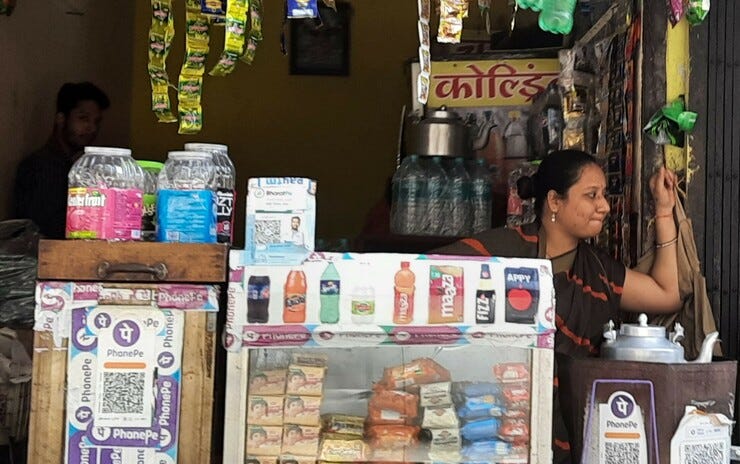RBI Deputy Governor gets blunt with banks
Last month UPI went on to scale another record volume crossing 7,309 million transactions with more than half coming in from the payments to merchants segment. NPCI has once again extended its 30% market cap deadline, this time by two years - Deepak Abbot has an excellent piece explaining the reasons behind this extension, and why it is unlikely that anything will change dramatically in the future. In fact, RBI Deputy Governor T Rabi Sankar was quite blunt with banks during his speech at 18th Banking Technology Conference organized by the Indian Banks Association - "How is it that a system of transactions between two bank accounts has evolved in a way where most of the business is owned by non-banks? Clearly, banks have missed a step here." He pointed out that probably, their disdain for small value transactions has prevented them from seeing the bigger picture and increased business.
The digital payments space in India is undergoing a healthy churn. The Reserve Bank of India’s digital lending guidelines issued in September kicked in place this month and the fintech industry has been changing business models in alignment with the new rules, shutting down specific products where needed. Yet, fintech, NBFCs and banks continue to report concerns on challenges in integrating platforms as well as lack of clarity from the RBI, for instance on the First Loss Default Guarantee (FLDG) system.
The latest innovation to hit the Indian digital payments landscape is the operationalization of the Central Bank Digital Currency - Retail (e₹-R) pilot by Reserve Bank of India through eight banks in select locations and within closed user groups. The first month of the pilot on wholesale CBDC (e₹-W) has seen low volumes so far as traders are not seen to be taking positions yet. Meanwhile the Open Network for Digital Commerce (ONDC) has moved to its second location with beta testing in Delhi NCR, looking at food delivery, as against its pilot in Bengaluru that focused on grocery stores.
One more game changer in India’s evolving digital ecosystem has come through with the RBI approving the Goods and Services Tax Network (GSTN) as a Financial Information Provider (FIP) in the Account Aggregator framework. Cash-flow based lending will now be facilitated as access to this tax database will ease creditworthiness assessment, particularly for small businesses. We can also expect increased formalization through this move, as businesses see the value of joining the GST network.
An insightful report from Womens World Banking details the results of the product tested in collaboration with Bank of Baroda, that is Jan Dhan Plus, a solution aimed at encouraging regular saving by low-income women in their PMJDY accounts. The study highlights the barriers faced by women customers as well as business correspondents and explains that, instead of gender-neutrality in banking processes and products, financial inclusion calls for a gender-intentional approach.
****
Do follow our Indicus Centre for Financial Inclusion page on Linkedin to continue the conversation. Read on here for more of the latest news and views on financial inclusion in India, thanks!
GAME - Global Alliance for Mass Entrepreneurship, LEAD at Krea University and IKEA Foundation have an excellent report out on the impact of the pandemic on small businesses in India.
Karam Daulet-Singh and Sameeksha Chowla, Touchstone Partners, write on the impact of the RBI’s new guidelines on digital lending fintech, banks and NBFCs.
Suresh Sethi, MD CEO Protean eGov Technologies Ltd. gave a talk at Singapore FinTech Festival Founders Peak on "Banking on trust - how the ubiquitous postman became a catalyst for financial transformation."
Kalpana Ajayan and Ajit Agarwal, Women's World Banking, South Asia write on unlocking rural women banking potential through a strong Bank Sakhi network.
The Government of Maharashtra has signed a memorandum of understanding (MoU) with Women's World Banking, with funding support from Metlife Foundation, to operationalise and strengthen 5,000 women of Self-help Groups to become business correspondents or BC Sakhis in rural areas.
MSC has a study out on the experience of female beneficiaries of government Direct Benefits Transfers.
The government released the Draft Digital Personal Data Protection Bill 2022 for public feedback open till 17th December 2022. Medianama has a curated reading list on the bill. Also read comments from Deepak Maheshwari in the Hindu Business Line and Beni Chugh in Moneycontrol.
Ravi Kumar Narra, National President the Dalit Indian Chamber of Commerce and Industry (DICCI) is interviewed on the challenges faced by Dalit women entrepreneurs.
On Women's Entrepreneurship Day 9th November 2022, BW Businessworld spoke to female leaders to know what is the current status of and challenges faced by women-led MSMEs in India.
Anushka Sengupta reports for ETBFSI on the changing paradigm for fintech funding.
Rohit Kumar and Aishwarya Viswanathan write on the incentives and dynamics at play in the digital payments ecosystem.
Fino Payments Bank Ltd is looking to transition to becoming a Small Finance Bank, says Rishi Gupta, MD CEO in an interview.
Rahul Raj Founder CEO FloBiz explains how neobanks are filling the unmet credit needs of small businesses.
Bhavya Dilipkumar reports views from the payment industry on the latest RBI pilots on CBDC.




